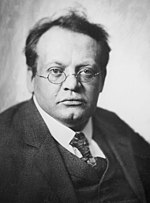Vier Tondichtungen nach A. Böcklin
| Vier Tondichtungen nach A. Böcklin | |
|---|---|
| Tone poems by Max Reger | |

The composer
|
|
| English | Four tone poems after Arnold Böcklin |
| Catalogue | Op. 128 |
| Based on | paintings by Arnold Böcklin |
| Dedication | Julius Buths |
| Performed | 12 October 1913: Essen |
| Published | 1913 |
Vier Tondichtungen nach A. Böcklin (Four tone poems after Arnold Böcklin), Op. 128, is a composition in four parts for orchestra by Max Reger, based on four paintings by Arnold Böcklin, including Die Toteninsel (Isle of the Dead). He composed them in Meiningen in 1913.
While tone poems were a common genre around 1900, including many works by Richard Strauss, Reger typically wrote more abstract music. He described his Eine romantische Suite, Op. 125, and the tone poems after Böcklin as "Ausflug in das Gebiet der Programmusik" (Excursion in the realm of program music).
Reger composed the four tone poems in Meiningen from end of May to July 1913, after planning it from October 1912. He dedicated the work to Julius Buths. The score and parts were published by Bote & Bock in September 1913. Reger conducted the first performance in Essen on 12 October that year, with the Städtisches Orchester (municipal orchestra).
The four parts are in contrasting tempo, slow–fast–slow–fast. Both slow movements, 1 and 3, are marked Molto sostenuto (aber nie schleppend) (but never dragging), both fast movements Vivace.
The work is scored for a symphonic orchestra of three flutes (including (piccolo), two oboes (including Cor Anglais), two clarinets, two bassoons, contrabassoon, four horns, three trumpets, three trombones, tuba, harp, three timpani and more percussion, solo-violin, strings (divisi in I). The pieces can be played individually or as "a quasi-symphony".
Der geigende Eremit (The Hermit Fiddler, literally: The hermit playing violin) is based on a painting Der Einsiedler (The Hermit) that Böcklin made in Florence in 1884. A solo violin is contrasted by a group of strings playing con sordino and another group playing not muted. The "ethereal violin" has been compared to Ralph Vaughan Williams' The Lark Ascending, composed in 1914.
...
Wikipedia
